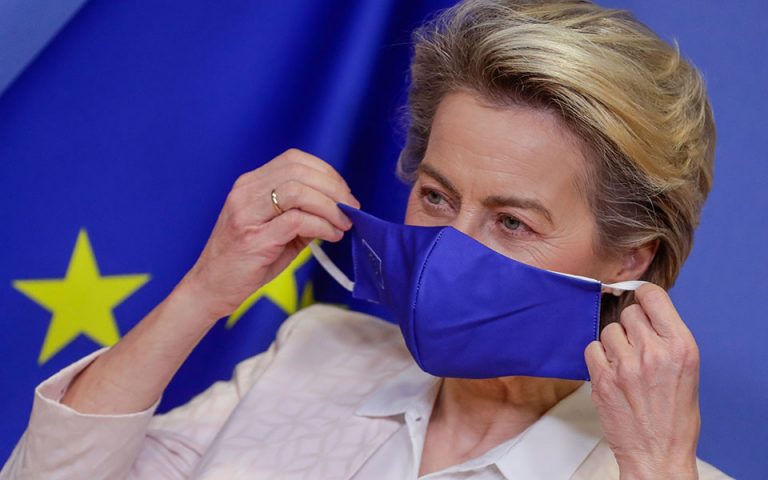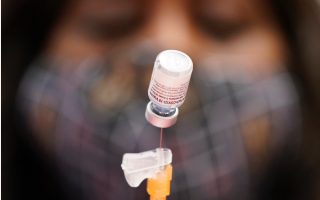EU chief: 60% of bloc to be inoculated by mid-2021

Nearly 500 million doses of the coronavirus vaccine could be made available to European Union member-states by the end of the first semester of 2021, according to the bloc’s chief executive, Ursula von der Leyen. In an interview with correspondents of several European newspapers, including Kathimerini, von der Leyen provided, for the first time, detailed figures for the first and second quarter of 2021, while revealing that the EU will receive 406 million doses of the three vaccines that have received authorization by the end of June.
Should the vaccines developed by Johnson & Johnson and CureVac also receive authorization by European authorities, as it is expected, the total number of doses will rise to 486 million. Kathimerini understands that Johnson & Johnson’s single-dose vaccine will account for 55 million of these doses. As a result, barring any other delays, 270 million Europeans, or 60 percent of the total population, will have been inoculated by midsummer. During the interview, the Commission reaffirmed the EU goal to have 70 percent of its adult population vaccinated by the end of the summer.
The interview was held in a spacious hall in the Berlaymont, the Commission headquarters, with masks and physical distancing, in the aftermath of what was perhaps the most tumultuous week of von der Leyen’s presidency. The clash with AstraZeneca exposed the limitations of the common European strategy on vaccinations and sparked strong reactions against the company and, in certain circles, against the Commission’s handling of the matter.
The hasty enactment on Friday of an export transparency mechanism for exports of Covid-19 vaccines led to a diplomatic incident as a clause originally imposed emergency export controls for vaccines across the land border between Ireland and British-ruled Northern Ireland. Meanwhile, the attempt to pass the blame to some of her Commissioners and the preferential treatment of German media have fueled intense criticism against her in the “Brussels bubble.”
Speaking on the slower rate of vaccinations in the EU compared to the spectacular performance of Israel, as well as the UK and the United Arab Emirates, von der Leyen said: “The difference is we decided, with the full consent of all the member-states, that there wouldn’t be any shortcuts in the scrutiny of the approval process and the examination of the data. Others gave an emergency authorization in 24 hours. I think it was a good decision to follow the full process and go for a conditional market authorization – which was given much faster than in normal times.”
Contradicting AstraZeneca CEO Pascal Soriot, von der Leyen insisted that the delay in signing advance purchase agreements was “not a limiting factor” in the supply of other authorized vaccines.
Furthermore, the Commission head voiced deep concern over the mutations of Covid-19, noting that the issue was discussed during a teleconference with the CEOs of the pharmaceutical companies with which the Commission has signed advance purchase agreements.
“So far, the indications are the variants are responsive to the vaccines. But we need to increase our preparedness in case new variants occur that create more problems… We have to improve the reporting on the sequencing of the virus; we have to invest in research and tailoring the vaccines to the changes in the virus, in constant close coordination with [the European Medicines Agency], to speed up the approval process; and – this is the most important – we must continue to scale manufacturing capacity [so as to produce the necessary quantities of the amended vaccines],” she said. A fresh meeting will take place in four weeks to review progress on the issue, she said.
Turning to the AstraZeneca controversy, von der Leyen said there was good cooperation between the two sides, while confirming that the first batch of 3.2 million doses will be delivered on Sunday, February 7. She said that another 4.9 million doses will be made available on February 17 and another 9.2 million by the end of the month – a total of 17.3 doses. She said 23 million doses will follow in March.
Von der Leyen said 18 million doses of the two approved vaccines, Pfizer-BioNTech and Moderna, have been delivered to EU member-states. A total of 33 million doses of the three vaccines are expected to be delivered in February and another 55 million in March.
Her comments suggest that there is still uncertainty over AstraZeneca’s plans in the second quarter. Asked whether the company will have covered the lost ground by the end of the second quarter, the Commission chief said officials will first have to examine the data from the export mechanism – which might allow for a further increase in the available doses in March. Speaking on the authorization of new exports, she said companies “will have to show what they have exported [and] where since last December. This will give us a full picture and then we can sit down with the companies and discuss on the basis of the true facts.”
Commenting on whether the additional 9 million doses by the end of March will also come from British manufacturing sites, she said: “AstraZeneca is a company that acts and produces on a worldwide scale. It is their decision how to organize themselves to deliver to their different customers. What we want is plausible explanations [for the delays] and an overview of coming deliveries… I explained to their CEO that there is no blockage from the side of the UK, so they are free to use these plants – and by the way these plants are mentioned in the contract [with the Commission].”





